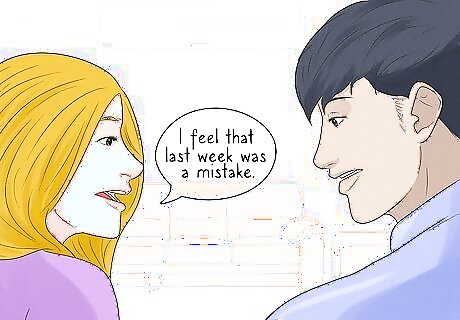
views
Making Your Decision

Recognize that virginity is a nebulous concept. There's no medical test to tell if someone is a virgin. Having sex doesn't fundamentally change your body, your identity, or your human dignity. Virginity wasn't always an idea in society. It has roots in sexism, and in men guaranteeing that they are the fathers of their children. It also has implications that a girl or woman is obedient to men. Hymens tend to erode on their own. If you have a hymen, it should be broken. (If not, you may need surgery to fix it, so that you'll be able to menstruate properly.) Different people define virginity differently. Does touching someone's private parts count? What about sexual activity between two women? Many people say that you still count as a virgin if someone forced, manipulated, or coerced you. You didn't consent to what happened to you, and it was not your fault.

Remember that sex isn't evil. Having sex doesn't make someone "bad" or "dirty," and being a virgin doesn't make someone superior, or even automatically good. Your morality is not stored between your legs. Even if you made a mistake or a bad decision related to sex, that doesn't mean you're a bad person. Good people can make mistakes, and good people can have sex that isn't a mistake. Sex can be a beautiful thing, between two consenting adults. It can sometimes lead to the joys of having children. Think of the adults who are role models in your life. Most or all of them have probably had sex. Their private activities with consenting partners don't change the wonderful things they do. There's only one instance of sex that makes a person bad: forcing, coercing, or nagging someone to have sex, when the person is unwilling or too helpless to consent. Sex isn't evil, but sexual assault is.
Moving Forward

Accept what happened. The first step for any emotional recovery is acceptance. You can't change the past. Make peace with what happened to you. This doesn't necessarily apply if you were a victim of violence, coercion, manipulation, or another awful thing that someone did to you. If you were raped, or think that you may have been raped, talk to a counselor or a trusted loved one who doesn't victim-blame. Recovering from sexual assault can be very difficult, and it helps to have a strong support network.

Forgive yourself if you made a mistake. Sometimes people make bad choices, or do something and then regret it later. Good people can make mistakes, and you're allowed to mess up sometimes. It's also okay if you don't regret it. If you feel like you gained a better understanding of sex or yourself from it, that can be a good thing.

Have an honest talk with your sexual partner, if needed. If you're still in touch with the person you had sex with, then be honest about how you feel. This way, they can manage their expectations. "I feel that last week was a mistake. I'm not ready to have a sexual relationship. Sex is a big deal to me, and I want to stay celibate for now. I still value our relationship. If being abstinent isn't a dealbreaker for you, then I want to keep dating." "I feel really awkward about what happened. I feel like it was bad judgment on my part to rush into things. We can be friends, if you'd like." "I've never done anything like that before, and I realize now that I'm not ready for it. I hope you understand." "I made an impulsive choice. I don't regret it, but I don't plan on doing it again."

Consider how long you want to stay celibate. Most people don't abstain from sex forever, and that's okay. Think about your timeline and your goals. Here are some examples of what different people might decide: "I want to wait until I'm 18. Then I'll see how I feel." "I'm not having sex until I feel more confident saying no to people, and expressing my feelings." "I intend to wait until marriage, for religious reasons." "I'll be celibate until college, and then I'll re-evaluate." "I need to learn more about contraception and STIs first. I need to be educated before I make any big decisions." "I'm waiting until I find someone really special." "I feel ashamed of my body, and that's a problem. I need to work on that first." "I can't talk about sex without blushing. I'm pretty sure that means I'm not ready." "I need to figure out my sexual orientation first." "I'm going to get my severe anxiety disorder under control first. I need to focus on self care right now." "I'm going to wait until I sort out my religious beliefs." "I just don't feel ready. I plan to wait indefinitely, until my feelings change."

Learn from the experience. You may now have a better idea of what sex entails, how you feel about sex, and what you do and don't feel ready for. See what insights you can gain from your experience, and how you can use that to inform your future decisions. Don't assume, though, that your first time will be representative of sex as a whole. The first time is usually awkward, and doesn't always feel very good. It gets better when you have more practice, and you have a partner who is good at communicating.




















Comments
0 comment